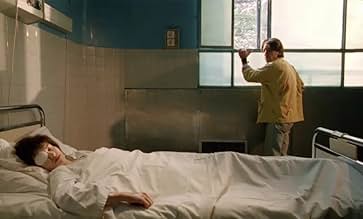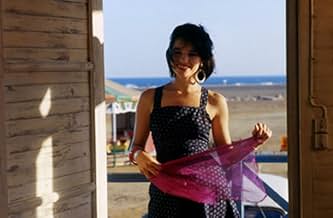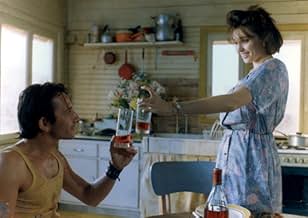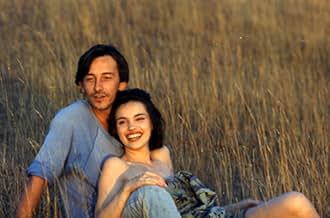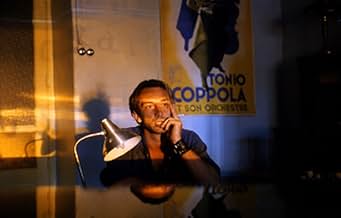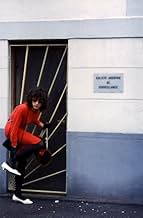
clip wiedergeben2:05
Betty Blue: The Director's Cut (Zorg Arrives Home To Find Betty Gone) ansehen
Ein lustloser Handwerker und angehende Romancier versucht, seine jüngere Freundin zu unterstützen, als Sie langsam dem Wahnsinn erliegt.Ein lustloser Handwerker und angehende Romancier versucht, seine jüngere Freundin zu unterstützen, als Sie langsam dem Wahnsinn erliegt.Ein lustloser Handwerker und angehende Romancier versucht, seine jüngere Freundin zu unterstützen, als Sie langsam dem Wahnsinn erliegt.
- Für 1 Oscar nominiert
- 5 Gewinne & 12 Nominierungen insgesamt
Béatrice Dalle
- Betty
- (as Beatrice Dalle)
Gérard Darmon
- Eddy
- (as Gerard Darmon)
Clémentine Célarié
- Annie
- (as Clementine Celarié)
Nathalie Dalyan
- Maria
- (as Nataly Dalian)
André Julien
- Le vieux Georges
- (as Andre Julien)
Bernard Robin
- Deuxième locataire
- (as Bernard Robin)
Handlung
WUSSTEST DU SCHON:
- Wissenswertes"37,2 Le Matin" - the French title of the film, is a woman's body temperature in Celsius, when she is ovulating.
- PatzerWhen Eddy's mother is lying dead on the bed, she is clearly breathing.
- Alternative VersionenAlso available in a 178 minute Director's Cut version.
- VerbindungenFeatured in 100 Greatest Sexy Moments (2003)
- SoundtracksBetty Et Zorg
Written and Performed by Le Grand Orchestre De Gabriel Yared
Ausgewählte Rezension
In music, a "blue note" is a note which departs from the expected major scale and instead goes minor (flat). You've heard it a million times in blues or jazz; it's "that note" that makes you go "oooooooh". In the film "Betty Blue", a meticulously crafted, deeply symbolic, allegorical tale of passion and madness, there's a wonderful scene where the 2 main characters slip away from a funeral wake in the middle of the night, find a room of pianos and play an impromptu duet. In this scene, the man and stable component of the relationship, Zorg, plays a chord progression while Betty, the volatile component, comes in with a simple melody hitting that powerful blue note.
Why am I harping on this one scene? It's because it shows how carefully planned and meaningful this film is right down to the music. And we haven't even touched the visuals: the incredibly surreal lighting, colors and set design, or the first class acting from everyone involved, or the hypercharged story itself. This is one of those films like "Citizen Kane" which experts can spend decades dissecting on a technical as well as artistic level. Whether you approach it like that, or whether you just sit back and take in the experience, either way, this film works.
"Betty Blue" is, on the surface, a love story. Underneath the surface it's the quintessential story of an artist and muse. Zorg is the artist (in this case, a failed writer) while Betty is the muse, a powerful, passionate force that suddenly drops in on him, adoring his simple scribblings to the point of obsessive madness, forcing her own passion upon him and driving him to write and believe in himself even though he barely knows or cares what he's doing. He simply wants to hold on to Betty as if his entire being depends on her because he knows what a rare force she is.
If you happen to be a writer, artist, musician, inventor, or anyone with creative leanings, you'll really grasp this angle. Even if you're not in those fields, you'll still grasp the story of a person who finds pure passion and will do anything to keep it.
Although I'm describing this story from Zorg's perspective, the movie is really about Betty. Zorg is almost just a bystander in his own life, experiencing the passion, volatility and violence of his lover. I thought this was a fantastic angle, even though you may be perplexed at his lack of reactions in some cases. For example early in the film Betty has a big flipout and throws all of Zorg's earthly belongings out the window. Zorg watches from afar with hilarious detachment, chatting calmly with a neighbor as if they're watching waves break on the beach. The film is full of surreal/comical moments like that, and that's what offsets the brutality of it all. Think of it: if your lover flipped out and destroyed everything you own, it probably wouldn't feel like a beautiful, artistic moment. But in this film it is. It's magnificent and oddly triumphant at the end of the scene.
Ok now the disclaimer: "Betty Blue" is a tough film for American audiences. This is mainly because there's a ton of very explicit nudity and sexuality bordering on softcore porn. Do NOT watch this with your parents. And for the love of all that's holy do NOT watch it with your kids. Honestly I wouldn't watch it with anyone because I would feel so uncomfortable. Full frontal nudity, both genders, kissing of private parts, and of course there's that opening scene: a brutally voyeuristic shot of the two having sex for a solid minute or two without any cuts, dialogue or distractions. But if you can handle that first scene, then your all set. Oddly enough, this film doesn't try to be erotic. It's hard to describe, but the explicit sex scenes convey passion without necessary getting bogged down in eroticism, thus avoiding any cheese factor that often comes when filmmakers try too hard to be sexy.
It may also be a difficult film for American audiences because it's just plain long (assuming you watch the 3-hr director's cut which you should). There isn't a clear, summarizable plot. The entire story is somewhat episodic and random, with sudden bizarre life changes happening that change the entire backdrop of the film. But this is precisely the point. Almost like a weird Alice in Wonderland fantasy, you have the main character(s) and everyone else is peripheral, everything surrounding them is surreal and inexplicable. This creates a sort of bubble around Betty and Zorg where we the audience feel what they feel: that the only thing that matters in the world is their love for each other.
I highly recommend this film to anyone who goes to the cinema for more than thrills and popcorn. I would rank "Betty Blue" up there with other artistic masterpieces by Kubrick ("Clockwork Orange", "2001") or Kieslowsky (Blue, White, Red Trilogy) or Wim Wenders ("Paris, Texas", "Wings of Desire", "Until the End of the World"). All of these films are somewhat difficult to watch because they're not easily digestible entertainment, and unfortunately that's why they're not marketed here and you'll probably drop a few bills ordering a rare import copy, but it's worth it.
Why am I harping on this one scene? It's because it shows how carefully planned and meaningful this film is right down to the music. And we haven't even touched the visuals: the incredibly surreal lighting, colors and set design, or the first class acting from everyone involved, or the hypercharged story itself. This is one of those films like "Citizen Kane" which experts can spend decades dissecting on a technical as well as artistic level. Whether you approach it like that, or whether you just sit back and take in the experience, either way, this film works.
"Betty Blue" is, on the surface, a love story. Underneath the surface it's the quintessential story of an artist and muse. Zorg is the artist (in this case, a failed writer) while Betty is the muse, a powerful, passionate force that suddenly drops in on him, adoring his simple scribblings to the point of obsessive madness, forcing her own passion upon him and driving him to write and believe in himself even though he barely knows or cares what he's doing. He simply wants to hold on to Betty as if his entire being depends on her because he knows what a rare force she is.
If you happen to be a writer, artist, musician, inventor, or anyone with creative leanings, you'll really grasp this angle. Even if you're not in those fields, you'll still grasp the story of a person who finds pure passion and will do anything to keep it.
Although I'm describing this story from Zorg's perspective, the movie is really about Betty. Zorg is almost just a bystander in his own life, experiencing the passion, volatility and violence of his lover. I thought this was a fantastic angle, even though you may be perplexed at his lack of reactions in some cases. For example early in the film Betty has a big flipout and throws all of Zorg's earthly belongings out the window. Zorg watches from afar with hilarious detachment, chatting calmly with a neighbor as if they're watching waves break on the beach. The film is full of surreal/comical moments like that, and that's what offsets the brutality of it all. Think of it: if your lover flipped out and destroyed everything you own, it probably wouldn't feel like a beautiful, artistic moment. But in this film it is. It's magnificent and oddly triumphant at the end of the scene.
Ok now the disclaimer: "Betty Blue" is a tough film for American audiences. This is mainly because there's a ton of very explicit nudity and sexuality bordering on softcore porn. Do NOT watch this with your parents. And for the love of all that's holy do NOT watch it with your kids. Honestly I wouldn't watch it with anyone because I would feel so uncomfortable. Full frontal nudity, both genders, kissing of private parts, and of course there's that opening scene: a brutally voyeuristic shot of the two having sex for a solid minute or two without any cuts, dialogue or distractions. But if you can handle that first scene, then your all set. Oddly enough, this film doesn't try to be erotic. It's hard to describe, but the explicit sex scenes convey passion without necessary getting bogged down in eroticism, thus avoiding any cheese factor that often comes when filmmakers try too hard to be sexy.
It may also be a difficult film for American audiences because it's just plain long (assuming you watch the 3-hr director's cut which you should). There isn't a clear, summarizable plot. The entire story is somewhat episodic and random, with sudden bizarre life changes happening that change the entire backdrop of the film. But this is precisely the point. Almost like a weird Alice in Wonderland fantasy, you have the main character(s) and everyone else is peripheral, everything surrounding them is surreal and inexplicable. This creates a sort of bubble around Betty and Zorg where we the audience feel what they feel: that the only thing that matters in the world is their love for each other.
I highly recommend this film to anyone who goes to the cinema for more than thrills and popcorn. I would rank "Betty Blue" up there with other artistic masterpieces by Kubrick ("Clockwork Orange", "2001") or Kieslowsky (Blue, White, Red Trilogy) or Wim Wenders ("Paris, Texas", "Wings of Desire", "Until the End of the World"). All of these films are somewhat difficult to watch because they're not easily digestible entertainment, and unfortunately that's why they're not marketed here and you'll probably drop a few bills ordering a rare import copy, but it's worth it.
Top-Auswahl
Melde dich zum Bewerten an und greife auf die Watchlist für personalisierte Empfehlungen zu.
Details
- Erscheinungsdatum
- Herkunftsland
- Offizieller Standort
- Sprache
- Auch bekannt als
- Betty Blue
- Drehorte
- Gruissan, Aude, Frankreich(beach resort)
- Produktionsfirmen
- Weitere beteiligte Unternehmen bei IMDbPro anzeigen
Box Office
- Bruttoertrag in den USA und Kanada
- 2.016.851 $
- Eröffnungswochenende in den USA und in Kanada
- 29.383 $
- 9. Nov. 1986
- Weltweiter Bruttoertrag
- 2.016.851 $
Zu dieser Seite beitragen
Bearbeitung vorschlagen oder fehlenden Inhalt hinzufügen

Oberste Lücke
What is the Canadian French language plot outline for Betty Blue - 37,2 Grad am Morgen (1986)?
Antwort
![Bande-annonce [OV]](https://m.media-amazon.com/images/M/MV5BMDAyNWU0OWQtYjdiMC00ZWU5LWI4MmItZjdhMjBiMTc0MDk4XkEyXkFqcGdeQXRodW1ibmFpbC1pbml0aWFsaXplcg@@._V1_QL75_UX500_CR0)




